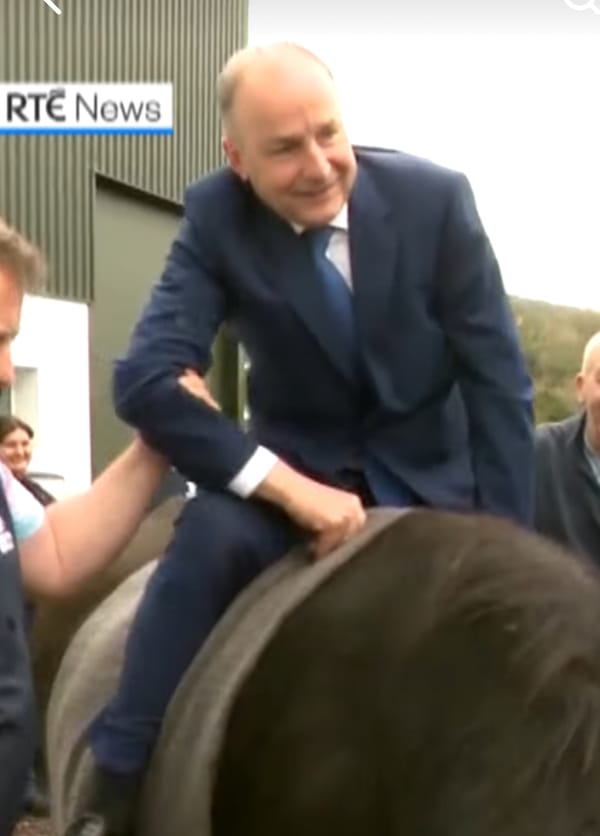The Gist: Coimisiún na Meán go off the rails
The Irish State announced its new plan to build a porn preference register for most of the EU, amongst other mad things. This is the Gist.

Let's start with where things stand right now and then go from there.
The first thing I should say: this is not a joke.
I say that now, because later on, as you're reading the rest of this piece, you're going to keep asking yourself "Is this some kind of a joke?"
Hence, this helpful reference statement for you to return to repeatedly throughout.
This week the Executive Chairman of the new Irish regulator for internet content, Jeremy Godfrey, made himself available for comment to the press to discuss the Coimisiún na Meán (Media Commission) plan to introduce a code of conduct to control how adults would access websites.
He outlined the plan set out in page 17 of their Consultation and proposal document to the Irish Examiner.
This body regulates content (and in particular video content) for the largest internet companies in the world due to the fact so many of them are based in Ireland.
Mr Godfrey suggested that his Commission would require adults and minors (children under 18) to send a copy of their passport to websites- including porn sites- and then, also, send them a live selfie so the porn sites could see what they looked like right now. And then the porn sites would run biometric data processing on those images (details unspecified) to confirm they were over 18. Call this the Nightclub Bouncer plan.
This is the national internet regulator proposing that it would require that everyone, adult and children alike, would upload their state ID and live selfies, to porn sites to have biometric processing of their facial images performed. Resulting, amongst other things, in an effective register of porn preferences for adults and a collection of selfies of children kept by the porn sites for six years (required to prove they have complied with the regulation, you see).
I refer you now to the top of the newsletter. I am still not joking.
But wait! That's not all! The CnaM Executive Chairman wanted to talk about porn sites because that's the least popular class of entities covered by this regulation. But the age-verification requirement actually can cover any video-sharing platform under the jurisdiction of the Irish State (link to the designation notice under section 139E and section 139G of the Broadcasting 2009 Act). That's a list that includes Facebook, WhatsApp, XTwitter and YouTube, just to pick four household names (because of Section 5 of the Online Safety and Media Regulation Act 2022). It might also mean homegrown platforms such as Mastodon.ie, the most prominent Irish part of the Fediverse, who also allow videos to be shared.
In fact, Section 2 of the Broadcasting Act 2009 (as amended) casts the net wide enough to cover almost anywhere that lets you post a video.
In this Act, ‘video-sharing platform service’ means, subject to subsection (3), a service, within the meaning of Articles 56 and 57 of the Treaty on the Functioning of the European Union, where—
(a) the principal purpose of the service is devoted to,
(b) the principal purpose of a dissociable section of the service is devoted to, or
(c) an essential functionality of the service is devoted to,
providing audiovisual programmes or user-generated videos, or both, by electronic communications networks, to the general public, in order to inform, entertain or educate.
Also, these restrictions won't just limit and record access to porn sites. They can be applied to any sites which contains material the Commission decides may be legal, but on the other hand, oughtn't be seen by children. In other countries, this has been the kind of legal provision which has seen libraries restricting access to books involving LGBTQ+ themes, racial justice themes and anything else you could imagine the Burke family objecting to.
The exact description of what is to be restricted behind the Commission's Nightclub Bouncer plan is simply 'age-inappropriate content', defined broadly in Section 45 of the Online Safety Act 2023 as "online content that is likely to be unsuitable for children (either generally or below a particular age), having regard to their capabilities, their development, and their rights and interests". It goes on to give examples of pornography and acts of violence, but the controls aren't limited to them.
This plan goes far beyond the requirement of the EU Audio-visual directive, which the EU Commission suggests "could be done by the use of PIN codes". The Commission also points out that the Audio-Visual Directive has no "restrictions for programmes which might simply be "harmful"". The proposal therefore must be measured against the twin EU law requirements of "necessity and proportionality" under the Charter of Fundamental Rights and the GDPR. It fails both tests, of course.
If there is an alternative method of meeting the requirement of age restriction (as the European Commission's suggestion of the use of PIN numbers demonstrates) then it fails the test of necessity and cannot be in compliance with EU law.
And even if there were no other method, it has to be considered whether creating a distributed database of internet use, including porn preferences, for all EU adults is proportionate to the aim being pursued. Then consider it also requires the additional security risk of sending copies of sensitive personal documents such as passports to platforms such as Elon Musk's X AND also requiring they perform biometric processing of article 9 GDPR facial data of both adults and minors. I think the question of proportionality answers itself by the time you reach the end of that sentence.
It is at this point that I feel justified in pointing to my interview on Morning Ireland from 2019, where I warned that the Broadcasting Authority of Ireland was the wrong body to put in charge regulating the internet, because it had neither the experience nor understanding of the medium necessary.
In creating Coimisiún na Meán the Government did just that. The fresh new regulator is now demonstrating exactly how unfit for this role it is.
I take it back. In a way, this is a joke. It just isn't funny.
Hello, dear reader. Many thanks for your interest in our first Gist of 2024. A reminder that you can subscribe for free or, if you would like to support the production of more Gists into the future on a self-hosted non-nazi system you can opt to contribute (from €2 a month) at this link. But please know, I will always love you equally, regardless of which subscription option is right for you.



